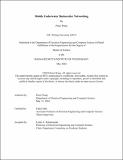Mobile Underwater Backscatter Networking
Author(s)
Wang, Purui
DownloadThesis PDF (2.047Mb)
Advisor
Adib, Fadel
Terms of use
Metadata
Show full item recordAbstract
Underwater backscatter is a recently introduced technology for ultra-low-power underwater networking. Despite advances in this technology, existing systems are limited to static environments and cannot operate reliably under mobility. This thesis presents EchoRider, the first system that enables reliable underwater backscatter networking under mobility. EchoRider’s design introduces three new components. The first is a robust, chirp-based downlink protocol that brings the benefits of LoRa wireless networks to underwater backscatter, while accounting for the ultra-low-power nature of the backscatter sensor nodes. The second is a novel NACK-based backscatter retransmission algorithm, which enables reliable and efficient underwater backscatter. The third is a Doppler-resilient backscatter decoding pipeline on the uplink that features adaptive equalization, polar coding, and an equalizer retraining mechanism. We implemented an end-to-end prototype of EchoRider and compared it to a state-of-the-art baseline. Our evaluation across more than 1,200 real-world experimental trials in real-world environments demonstrates that EchoRider outperforms the state-of-the-art baseline by more than 160× in BER under mobility, and that it can sustain typical underwater goodput (around 0.5kbps) in scenarios where the baseline’s goodput drops to zero at speeds as low as 0.1m/s. Finally, we demonstrate EchoRider in an example application involving an underwater mobile drone and a backscatter sensor node.
Date issued
2024-05Department
Massachusetts Institute of Technology. Department of Electrical Engineering and Computer SciencePublisher
Massachusetts Institute of Technology